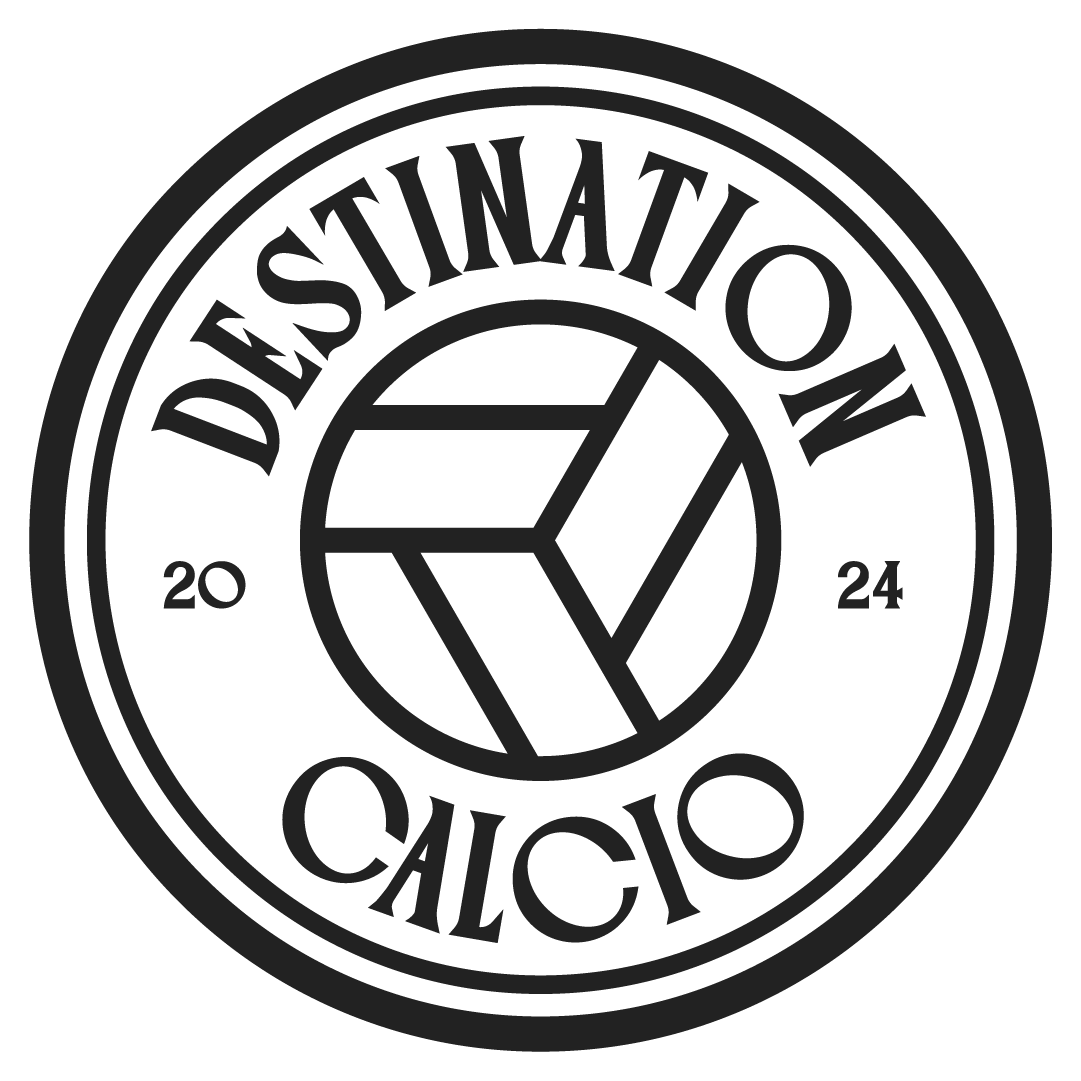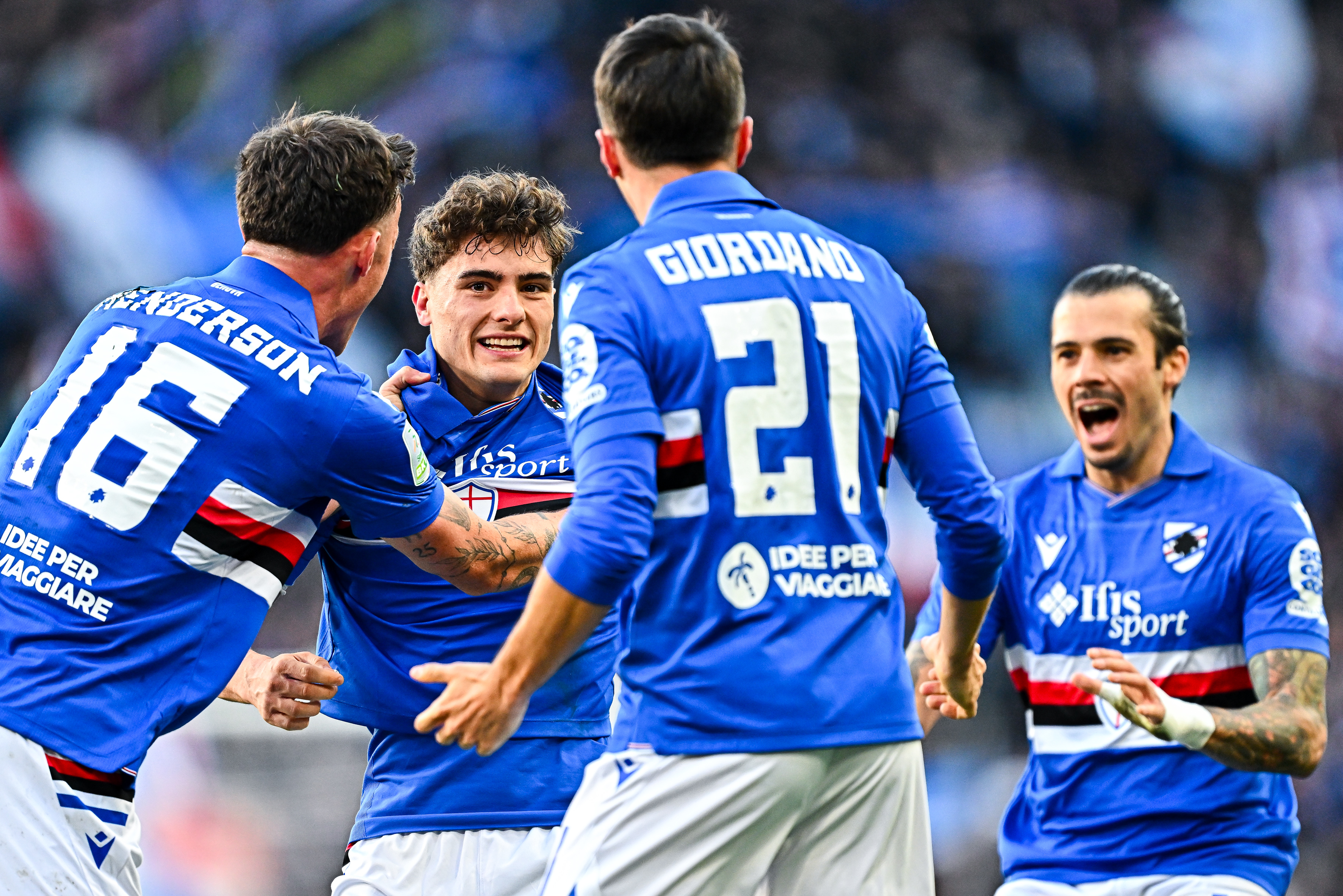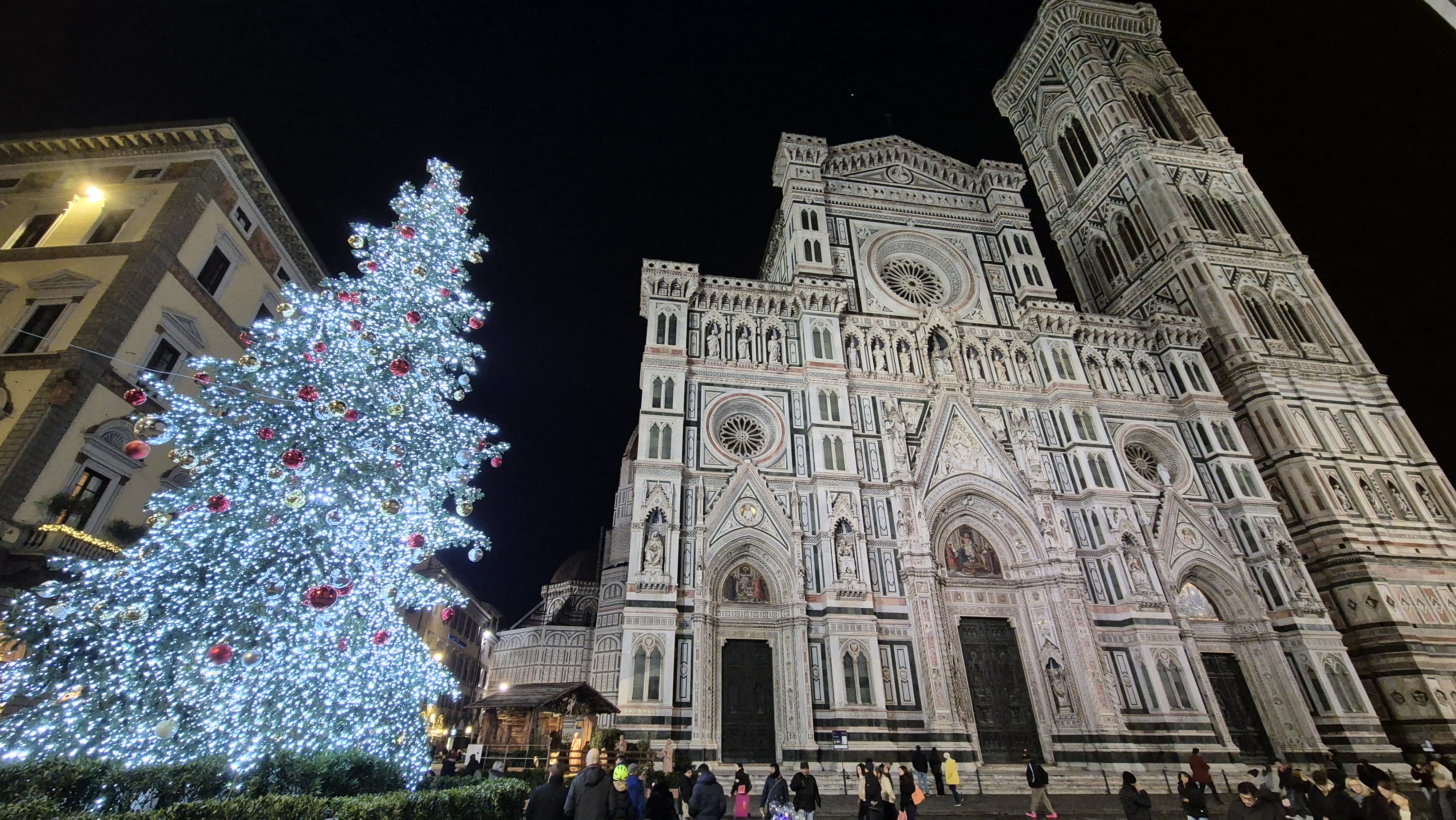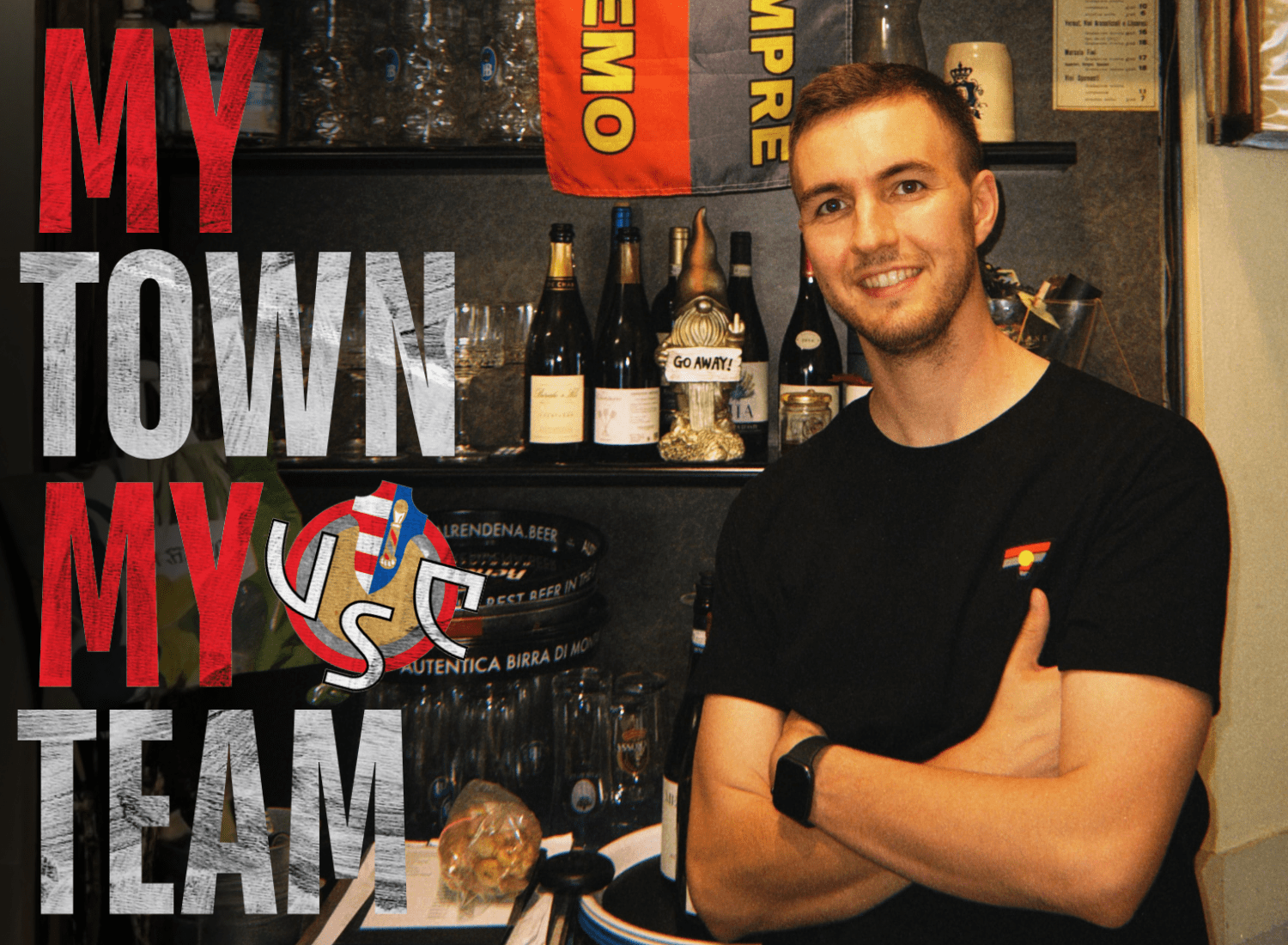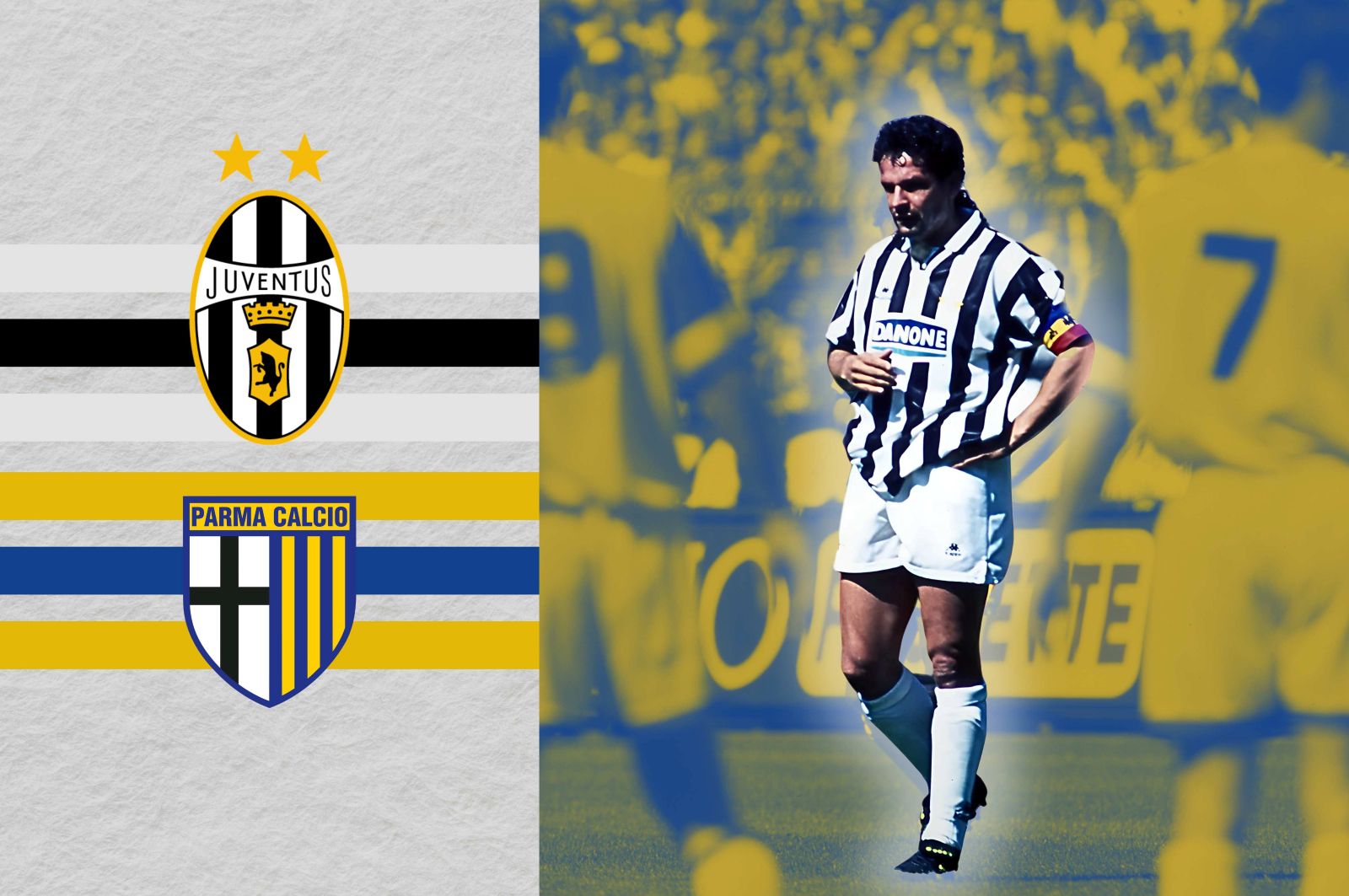
Classic Calcio, Juventus 4-0 Parma: A Roberto Baggio Masterclass 30 Years On
By Emmet Gates
The latest instalment of our Classic Calcio series takes us back to May 21, 1995 and a Roberto Baggio display for the ages when Juventus faced Parma.
For most big teams, nine years is a long time without a league title. For Juventus it felt like an eternity.
To a certain generation, Serie A in the late 1980s and early 1990s will always represent the league’s golden age.
There was Napoli and Diego Maradona; AC Milan, Arrigo Sacchi and the three Dutchman; Inter with the three Germans; Fiorentina and Roberto Baggio; Sampdoria with goal twins Gianluca Vialli and Roberto Mancini.
From 1986 to 1992 no team retained the Scudetto as it bounced from Naples to Milan to Genoa and back again. Serie A clubs broke the world transfer record time and again and flourished on the continent, with Milan, Inter, Napoli and Samp all winning European honours.
Italy’s grandest side were absent for most of the era. Bar UEFA Cup wins in 1990 and 1993, Juve were an afterthought, a club struggling to move on from the glorious Michel Platini period of the mid-1980s.
Giovanni Trapattoni had walked away from The Old Lady in the summer of 1986 after a decade in charge. Trap had overseen Juve’s dominance of the Italian game: Six Scudetti, two Coppa Italia, a European Cup, UEFA Cup, Cup Winners’ Cup and Intercontinental Cup had all been won.
Platini walked away a year later, retiring from the game at the tender age of 32 due to an accumulation of injuries and the belief his powers were waning.
The departures of two key figures within the space of a year sent Juve into something of a down spin. The following years were barren, the club lacked direction and didn’t know where it stood in the face of football’s Sacchi-influenced new age.
Gigi Maifredi, he of ‘champagne football’, was brought in alongside Baggio in the summer of 1990 to reboot Juve’s fortunes after a good season with Bologna.
Baggio stayed, but Maifredi didn’t. Sacked after only a year in which he failed to secure Juve a place in Europe for the first time in 28 years.
Juve’s dabble with entertaining football had failed, and so they returned to their roots with the second coming of Trapattoni.
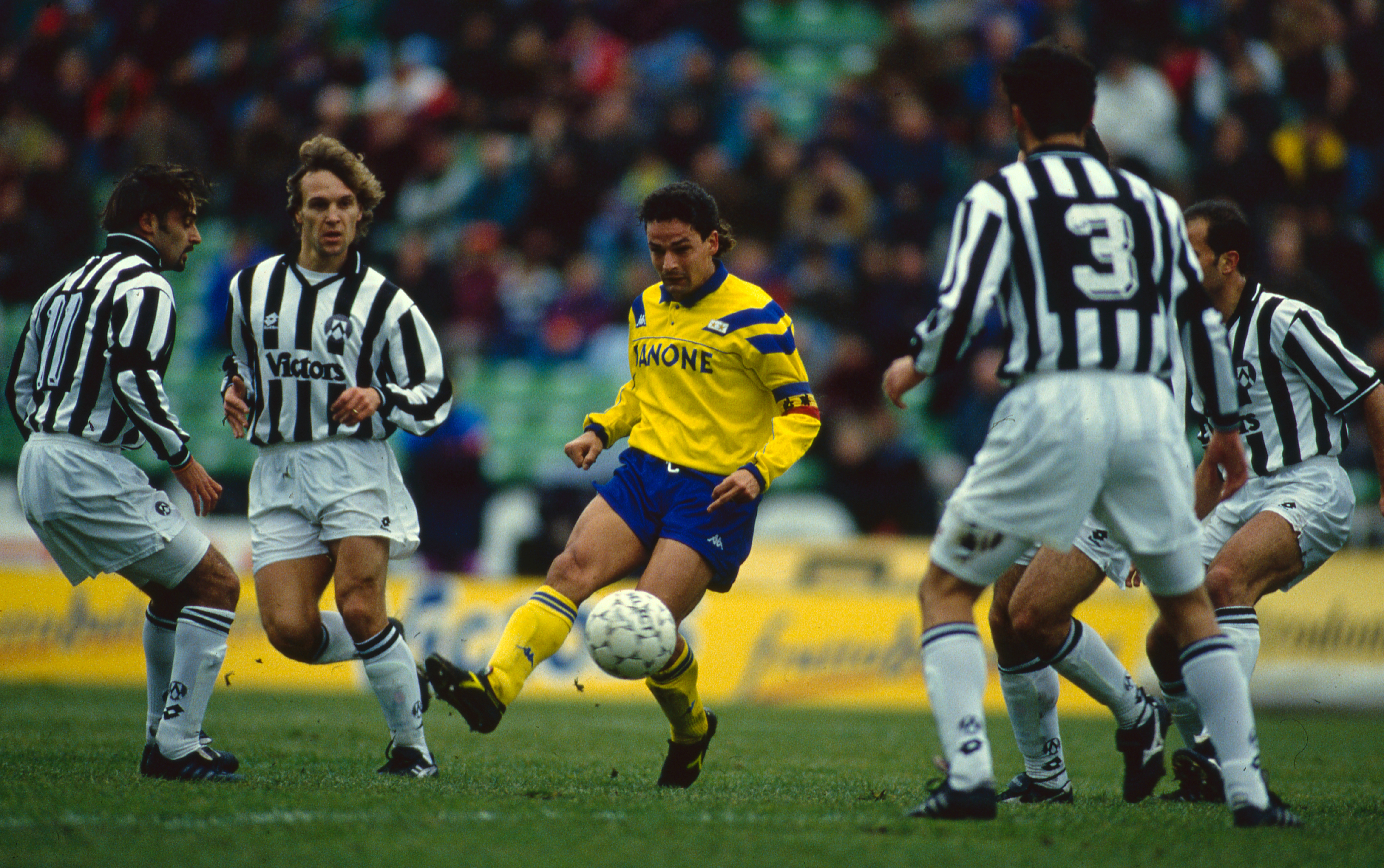
Il Trap’s second stint is far less memorable than his first. Trapattoni, along with Baggio in his prime, could do little to stop the winning machine that was Fabio Capello’s Milan. The Rossoneri won three Scudetti in a row, barely conceding a goal let alone losing a match.
After three years Trapattoni left in the summer of 1994 and was replaced by Marcello Lippi.
And this is where the true reboot began.
Lippi had vowed to make Juve less ‘Baggio dependent’, the argument being that if the opposition nullified him, they nullified Juve. This was not going to be an easy to fix. Baggio was still the world’s best player and Juve’s captain.
Yet everything in football is about timing, and Lippi arrived on the back of Baggio’s World Cup heartbreak in America. With the forward suffering from a USA 94 hangover and his fragile body always teetering on the edge of a major injury, Lippi was given the perfect chance to remould Juve without facing media scrutiny over the Divine Ponytail.
With calcio still in the Sacchi-influenced 4-4-2 era, Lippi opted for a 4-3-3. A young Alessandro Del Piero was pushed to the left, Fabrizio Ravanelli to the right and Vialli used through the middle.
Baggio had been in and out of the side in the early months, but suffered a knee injury in the 2-1 win at Padova in late November and the prognosis was five months on the sidelines.
While many wondered if Juve would be able to survive without him, Lippi was not overly concerned. The injury afforded him the perfect opportunity to reshape Juve’s future, one he hoped would exclude the No 10.
In truth, Baggio wasn’t missed in the intervening period. Juve won eight of the next 11 games as Del Piero, Vialli and Ravanelli shared the goals.
Vialli and Ravanelli were producing the season of their careers, while Del Piero’s tactical flexibility, pace and defensive diligence made up for the absence of Baggio’s genius.
Parma, meanwhile, were reaching their zenith under Nevio Scala. The Italian had been manager since their ascension to the top flight in 1990.
With the backing of dairy conglomerate Parmalat, Parma had upset the established order in Serie A in the early part of the 90s, winning domestic and European trophies.
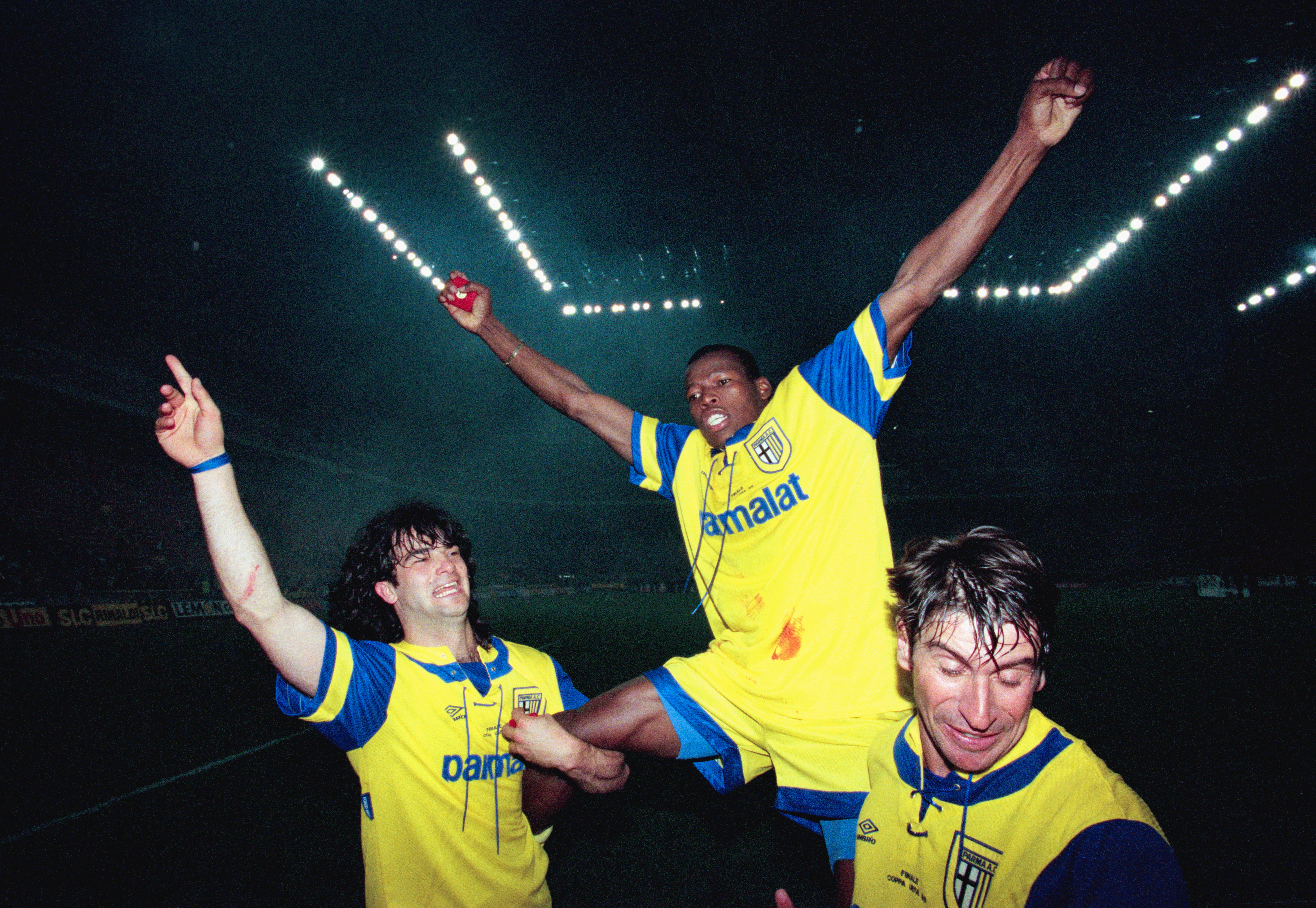
Like Lippi, Scala eschewed the popular 4-4-2 of the era to utilise a 5-3-2 formation. In 1994-95, the mercurial talents of Tino Asprilla and Gianfranco Zola led the line, with the latter in the form of his life.
Dino Baggio, a summer arrival from Juventus in a move that could have changed the course of history given Parma only pivoted to the midfielder after a deal for Del Piero collapsed at the 11th hour, had been a revelation.
Massimo Crippa and Tomas Brolin offered grit and flair, while young pair Marco Branca and Stefano Fiore were making their mark. At the back, Lorenzo Minotti, Antonio Benarrivo, Roberto Mussi, Nestor Sensini and Luigi Apolloni were all rugged operators.
Parma and Juve slugged it out in a way that has rarely been seen in the Italian game before or since. Battling for domestic and European superiority, they met six times in 1994-95 including two finals, with three games in May alone.
Parma emerged victorious in the UEFA Cup showpiece over two legs, winning 2-1 on aggregate. Their own Baggio scored both against his former employers.
The Coppa Italia final between the pair, also then a two-legged affair, was due to take place in early June. Sandwiched between the two finals was the second league meeting of the season at the Stadio Delle Alpi.
Parma and Juve had been the top two in the table all season, but as the chill of winter gave way to spring, Parma’s form began to slip. Consecutive losses in early April to Roma and Milan, combined with surprise draws to Foggia and Reggiana, allowed Juve to streak ahead.
Yet they also hit a few road bumps in the spring. Torino managed to do the double over their city rivals in the Derby della Mole, with Ruggiero Rizzitelli bagging a brace in a 2-1 win on April 9.
Juve then lost at home to Padova and suffered a 3-0 demolition by Lazio at the Delle Alpi two weeks later. The cost of battling on three fronts was high for both teams.
Juve had battered Genoa 4-0 at the Marassi in the week going into the game, while Parma picked up a 1-0 win at home to Bari.
By the time the pair were set to meet again on May 21, Juve were seven points clear with three games remaining. A win would bring home the Scudetto, anything else would keep Parma’s faint hopes alive.
Baggio returned from injury for the run-in and had been instrumental in pushing Juve on in the final couple of months of the campaign.
Restored to his favoured position behind Vialli and Ravanelli, the captain had eight goals and seven assists since his comeback, including a gorgeous free kick against Borussia Dortmund in the UEFA Cup semi-final.
No one realised at the time, but this was to be his last great match for Juve.
Going into the game Lippi had a full-strength squad to pick from bar the exceptional Ciro Ferrara, out injured. For Parma, Scala was also at full strength.
Lippi went 4-3-1-2; Scala 5-3-2 that morphed into a 3-5-2 when in possession. It had the ingredients to be an all-time classic.
On a gloriously sunny day in Turin, it would indeed go down as a game for the ages, but for only one club.
The opening exchanges were even, the ball ping-ponging back and forth as both sides tried to fall into a pattern. Paulo Sousa, one of the best midfielders in the league that season, was teed up by Baggio outside the box for a rasper of a shot that was straight down Parma goalkeeper Luca Bucci’s throat.
The Italian could only parry the ball high into the sky, but it was a warning that Juve – and that man Baggio – meant business.
One of the hallmarks of Lippi’s first version of Juve was intense pressing from the front men, it was an element that Ravanelli, Vialli and Del Piero perfected that season, and against Parma they were giving Scala’s back line little room to breathe.
The Gialloblu could barely keep hold of the ball, but they showed why they had been a threat all season, with Zola sliding a through ball for the surging Dino Baggio, but the midfielder was shepherded out by Sergio Porrini for a corner.
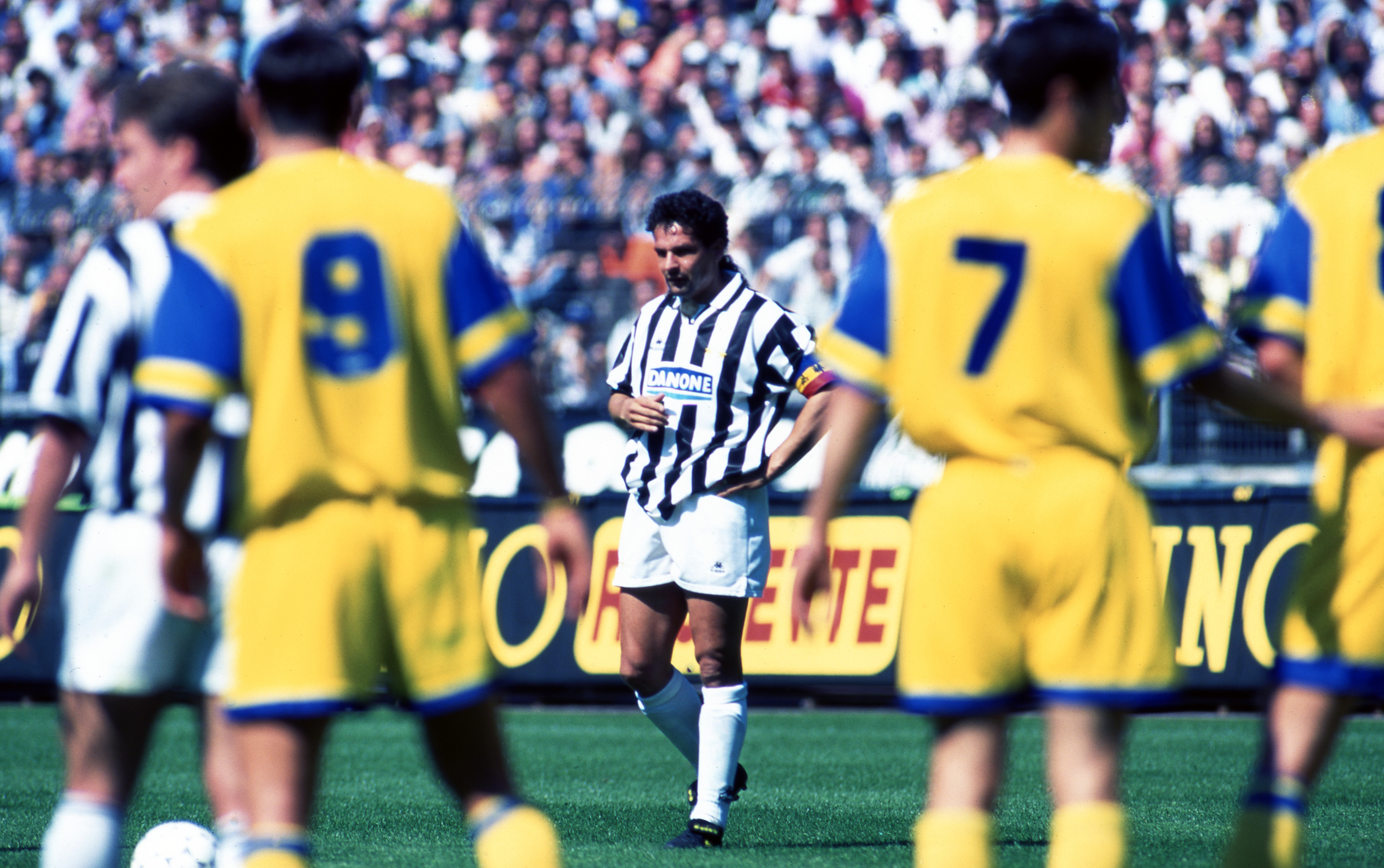
Parma’s No 10 took the resulting corner, but it indirectly led to the opening goal.
Zola’s corner was cleared from Juve’s box by Angelo Di Livio towards the middle of the pitch. Massimo Susic’s first touch was poor, it bounced off him into the path of Baggio, who showed him what ball manipulation was really like. He floated the ball over Susic and into the path of Ravanelli, who had ran behind Parma’s back line.
Ravanelli still had half of the pitch to run into, with Susic now giving chase. La Penna Bianca pushed the ball forward with his head until he stopped at the edge of the box. Susic had now caught up but the striker stopped the ball with his right foot before swinging with his left to bend his shot beyond Bucci into the bottom corner.
It was Ravanelli’s 13th league goal of the season and 27th in all competitions. Few were better than this one.
In a nod to the future, the camera panned to a shot of the late Umberto Agnelli, and sitting underneath him his son and future Juventus president, a young, fresh-faced Andrea.
Baggio was having great joy roaming between the lines, picking up the ball and causing havoc. Parma’s defenders didn’t know whether to pick him up, leaving space in behind for Ravanelli and Vialli, or stand off him. The link-up play between Juve’s front three at times was exceptional.
Parma, meanwhile, were showing they did not just come to Turin to be bystanders in the Roberto Baggio show. Zola and Asprilla also linked up well at times, demonstrating why they had scored 37 goals between them in all competitions.
Juve’s second arrived eight minutes before half-time. Didier Deschamps was a summer arrival from Marseille, but an injury in October kept him out for half the season. He returned for the run-in and formed a productive partnership with Sousa in midfield.
Deschamps, whose reputation outside of France and Italy has suffered due to Eric Cantona’s infamous ‘water-carrier’ remark, was not one for scoring many goals. In fact, in five years at Juve he scored four. His first one came here.
He actually started and finished the move. Dispossessing Zola with a slide tackle, the ball fell to Ravanelli in a central position. Baggio then made a diagonal run into the box. Ravanelli slid the ball into his path. Tightly marked by Mussi, the 1993 Ballon d’Or winner intelligently rolled it backwards with the sole of his foot to the onrushing Deschamps, who ran into the box unopposed. The Frenchman opened his body and bent the ball with his left foot into the opposite corner.
It was a sweeping move and Juve were moving the ball around with a fluidity that looked worthy of champions. A 23rd Scudetto was closing in.
The second half started much in the same fashion as the first. Parma could barely get a handle on the game. yet one glorious move saw Asprilla utilise those long limbs by evading first Deschamps and then Baggio with ease, gliding past the pair before sliding a pass into the feet of Crippa.
It was a reminder of the mercurial Colombian’s talent.
The Gialloblu were trying to get back into the game but Juve’s rearguard was resolute and not giving much away. If they did, then goalkeeper Michelangelo Rampulla was there to thwart everything. Zola should have done better with a free-kick but put it way over the bar from the edge of the box.
Juve’s third came against the run of play but again it was brilliant, and again Baggio was in the thick of it. Fiore’s through ball for Asprilla was intercepted by Porrini, who moved it to Ravanelli. The striker swivelled first time and hit it down the left-hand channel into the feet of Baggio, with space opening up ahead of him and Vialli alongside.
Vialli motored past Baggio and beyond Fernando Couto, knowing Baggio would slip the ball inside the defender and into Vialli’s path. Baggio showed Fiore how a through ball is perfectly weighted, feeding Vialli as he roared into the box.
Vialli took a touch with his right foot before striking it with his left, through the legs of Bucci. It was his 16th league goal of the season. It was Baggio’s third assist of the game, the man was popping up everywhere and gliding past Parma players with ease. In what was his 141st and final league outing as a Juve player, he was producing a masterclass.
Four minutes later, and the party really kicked off as Ravanelli added a fourth. Sousa sent a spectacular 50-yard diagonal pass from left to right in the direction of Vialli, who got in behind the Parma defence on the right hand side. He ran to the byline before cutting it back for Ravanelli, who ghosted ahead of Minotti and Couto to the front post and guided the ball into the net with his weaker right foot.
The game, and nine years spent in Scudetto purgatory, was over.
The final minutes were played amid a carnival atmosphere. Vialli almost added a fifth before Baggio was taken off after one last mazy run. Del Piero replaced the captain to a thunderous round of applause.
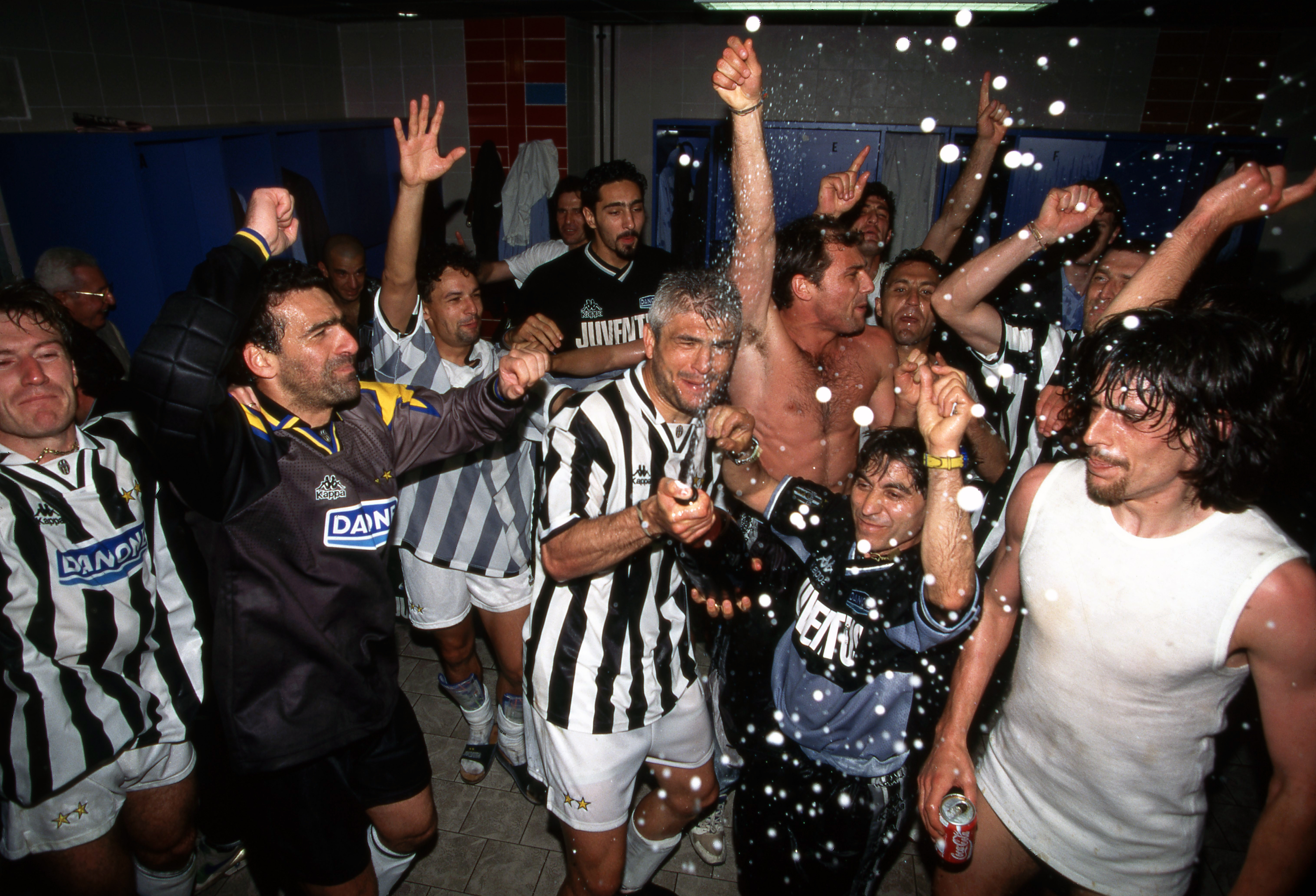
“It’s an indescribable joy,” said Baggio after the game. “I’m happy for the team and for the lads.”
Ravanelli dedicated the title to Gianni Agnelli and Lippi.
Parma were again seen off in the Coppa Italia final a few weeks later, a 3-0 win on aggregate securing Juve’s first domestic Double for 35 years.
Lippi had surpassed all expectations in his first season in Turin. He’d produced a team that didn’t need Baggio and toppled the seemingly unbeatable Milan dynasty within the space of 10 months.
When the infamous triad of Luciano Moggi, Roberto Bettega and Antonio Giraudo – key figures in the Calciopoli scandal – decided they were ready to move on from Baggio in the summer of 1995, Lippi didn’t stand in their way.
Yet Baggio left a winner, and his performance against Parma 30 years ago stands the test of time. A performer at the top of his divine powers.
Related Articles
Related Articles
The Serie B season reaches halfway when the action returns after the winter break, with more live matches to look forward to on DCTV.
Florence is a dream destination year-round, but visiting during the winter months offers a completely different and magical experience.
We get a local take on what's hot in Cremona - where to eat and drink, sights to see and handy hints that might not be in the tourist guides.
